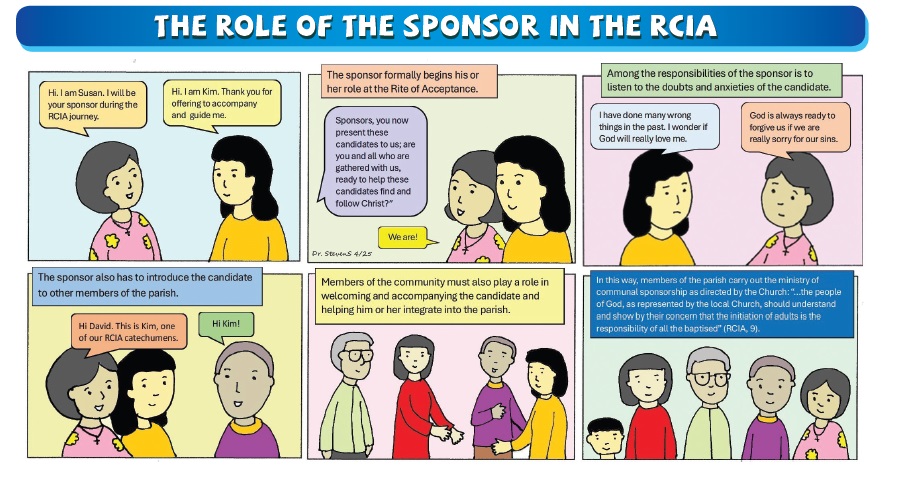The role of the sponsor in the RCIA
In general, the term ‘sponsor’ refers to an individual or group that supports and accompanies others or speaks on their behalf. In the RCIA, a sponsor is the person who comes forward to accompany and support the candidate who is seeking initiation into the Catholic Church.
Apr 18, 2025

Echoing the Faith - Dr Steven Selvaraju
In the previous article, I stated that although the term ‘godparent’ and ‘sponsor’ are used interchangeably in some Church documents, in certain circumstances, a clear distinction is made between these two offices or ministries. Such is the case with the adult catechumenate, namely, the Rite of Christian Initiation of Adults (RCIA). The RCIA presents the offices of sponsor and godparent as two inter-related but specific ministries, each having its own responsibilities. In this article, the role of the sponsor in the RCIA will be examined.
The role of the sponsor
In general, the term ‘sponsor’ refers to an individual or group that supports and accompanies others or speaks on their behalf. In the RCIA, a sponsor is the person who comes forward to accompany and support the candidate who is seeking initiation into the Catholic Church.
According to the Church, the sponsor “witnesses to the candidate’s moral character, faith and intention” (RCIA, 10). Basically, the sponsor serves as a companion and guide to the candidate. The one accepting the office of sponsor may already be known to the candidate, or where necessary, is assigned by the parish.
In the early Church, the process of sponsorship began with a Christian sharing the Gospel of salvation with an unbeliever - a family member, friend, colleague or even a stranger. Such evangelisation took place in the family, at work, a meeting or a social gathering. When the unbeliever expressed interest in knowing Christ, he or she was privately instructed and guided by the Christian. At this stage, a key responsibility of the Christian was to test the motives of the interested person.
As in the words of the Church Father, Origin of Alexandria (c. 185 – c. 253): “Before they were allowed to join the community, they had to give sufficient evidence of their desire to live a vitreous life”. Only when the Christian was convinced that the unbeliever’s motives were sincere was the latter introduced to the Christian community. Once the unbeliever was accepted into the catechumenate, the Christian would take on the role of sponsor to personally accompany the candidate during the catechumenal journey.
Personal accompaniment
In present times, the sponsor formally begins his or her ministry at the celebration of the Rite of Acceptance. During the entire rite, the sponsor accompanies the candidate closely. Each time the presider calls the candidate forward, the sponsor responds by standing at the candidate’s side, a gesture signifying the sponsor’s closeness to the candidate. The sponsor also presents the candidate to the assembly and speaks on behalf of the candidate.
When the presider addresses the sponsors with the words: “Sponsors, you now present these candidates to us; are you and all who are gathered with us, ready to help these candidates find and follow Christ?”, together with the assembly, they respond: “We are” (RCIA, 53). It is also significant that the sponsor joins the presider in the signation of the candidates, that is, to mark the sign of the cross on the forehead of the candidate (RCIA, 55A), thereby demonstrating the important role that the sponsor is to play in the faith journey of the candidate.
After the Rite of Acceptance, among the responsibilities of the sponsor towards the candidate (now known as ‘catechumen’) are to:
• serve as a source of basic information about the Catholic Faith. They are, however, not expected to catechise the candidate as this is the task of the RCIA catechists.
• listen to the candidate’s doubts and anxieties, as well as, to his or her hopes and aspirations.
• share his or her faith experiences in order to motivate the candidate.
• mediate with the RCIA team, if necessary, on behalf of the candidate.
• participate in the weekly RCIA sessions with the candidate since it is important for sponsors to continue learning about the Faith.
• accompany the candidate to liturgical celebrations, parish events and community gatherings.
• help the candidate integrate into the parish by introducing them to members of the community and to parish ministries and groups.
• pray for and with the candidate.
The sponsor is to journey with the catechumen up to the Rite of Election, after which, the godparent takes on the responsibility of accompanying the candidate (now known as ‘elect’) to the reception of the Sacraments of Initiation and beyond. Nevertheless, the sponsor can continue to be a close companion to the candidate throughout the rest of the catechumenal journey. Although not required, the sponsor can also become the godparent to the candidate. However, where possible, it is better to encourage other people in the community to take on the office of godparent, leaving the sponsor free to accompany another candidate in the next intake.
Communal accompaniment
There is an aspect of sponsorship that is often neglected in the RCIA process, that is, “communal accompaniment”. Basically, it means the entire parish community is also called to accompany the candidate since the task cannot be left to the sponsor alone. Baptised members must assist the sponsor in carrying out the responsibilities mentioned above. For example, community members can make the candidates feel at home in the parish or Basic Ecclesial Communities (BECs), share their faith experiences with them, volunteer to accompany the candidate to Mass and other liturgical celebrations, parish events and gatherings, invite them to their homes, pray for them and welcome them in other ways.
Conclusion
Therefore, the role of sponsor in the RCIA has two dimensions, namely personal and communal sponsorship. Both are inter-related and equally important. Although personal sponsorship has its specific role and responsibilities, the sponsorship of the community is essential for the effective implementation of the RCIA in the parish. As stated, “… the people of God, as represented by the local Church, should understand and show by their concern that the initiation of adults is the responsibility of all the baptised” (RCIA, 9). May we do our part to sponsor the candidates of the RCIA. 
(Dr Steven Selvaraju, STD, STL, holds a Doctorate in Theology with Specialisation in Catechetics and Youth Ministry from Pontifical Salesian University, Rome. He serves as Director of the Archdiocesan Catechetical Centre, Archdiocese of Kuala Lumpur.)







Total Comments:0